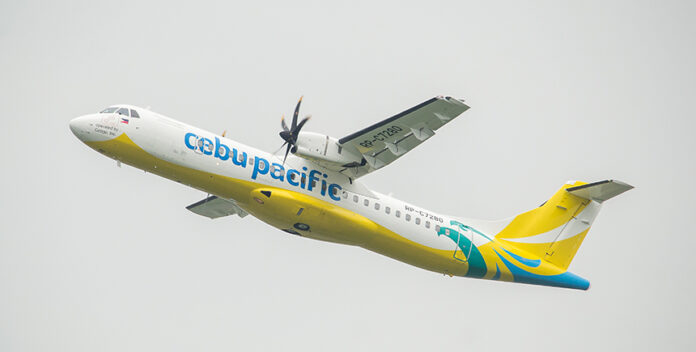-
Low-cost carrier Cebu Pacific is now focusing on transporting relief goods to provinces devastated by Typhoon Odette (Rai), even as it is working to stabilize its operations in the aftermath of the strongest typhoon this year
-
Cebu Pacific said it started to transport relief goods to Cebu on December 18 and has also been mounting humanitarian flights to bring home individuals stranded in provinces greatly affected by the typhoon
Low-cost carrier Cebu Pacific is now focusing on transporting relief goods to provinces devastated by Typhoon Odette (Rai), even as it is working to stabilize its operations in the aftermath of the strongest typhoon to hit the Philippines this year.
Cebu Pacific said it started to transport relief goods to Cebu on December 18 and has been mounting humanitarian flights to bring home individuals who were stranded in provinces that were greatly affected by the typhoon, which had lashed Visayas, Mindanao, and some parts of Luzon.
“We have been getting numerous requests to ship relief goods to areas hit by Odette. We are doing our best to accommodate all requests to help the provinces and communities which need supplies,” Cebu Pacific chief corporate affairs officer Michael Ivan Shau said in a statement.
To inform the public on the kinds of relief goods that are safe to carry by air and their proper packing, Cebu Pacific has listed the items that are allowed and not allowed on flights.
Items not allowed due to safety and logistical concerns are the following:
- Genset – Its content is considered as a dangerous good. Even if empty, the genset may not be accepted by Cebu Pacific due to concerns over possible traces of oil and gas. If there are no traces of fume, the item may be accepted in general cargo.
- UPS (uninterruptible power supply)
- Power banks – These are not allowed in check-in and cargo.
- Live animals, seafood, fruits, and vegetables – Cebu Pacific does not encourage their shipment these during this period due to logistical constraints
The following items, meanwhile, are allowed on certain conditions:
- Rubbing alcohol (isopropyl or ethyl) –Since this is flammable liquid, the airline cannot accept it if it’s not from Cebu Pacific-certified shippers or forwarders.
- Solar panels – These may contain hidden dangerous goods and cannot be accepted if not coming from Cebu Pacific-certified shippers or forwarders.
- Drinking water – Jugs in sizes of 6 liters, 5 gallons or 1 gallon should be in boxes so the staff can stack them properly and safely in the cargo space. Bottled water should be packed in boxes too.
- Rice – Sacks of rice should be in boxes or jack wrapped prior to delivery to the cargo warehouse.
- Clothing – Clothes should be packed in boxes.
- General grocery items – These should be packed in boxes.
- Frozen meat – Frozen pork and pork products are prohibited in Cebu province. Frozen beef, chicken and beef products are allowed but subject to Bureau of Quarantine requirements.
- Medicines/vitamin supplements – Over-the-counter medicines, prescription medicines and vitamins carried by passengers are allowed. If intended for cargo, passengers should coordinate with the Cargo Sales team for documentation requirements.
What’s allowed on board
As air travel continues to pick up this week, Cebu Pacific and sister airline Cebgo, meanwhile, appealed for the understanding and patience of passengers as safety remains the carriers’ priority.
Cebu Pacific is reminding the public not to proceed to the airport without a confirmed booking.
During this peak travel period, passengers for domestic flights are encouraged to be at the airport at least three hours before departure, and those for international flights should arrive four hours before departure.
Passengers are also advised to allot ample time for security inspection, check-in, bag drop and other pre-departure requirements, and ensure travel requirements are complete before proceeding to the airport.
Moreover, passengers should always check if their destination requires certain documents prior entry, and to do check-in online, whether through the Cebu Pacific mobile app or website.
Online check-in is available from seven days up to one hour before scheduled time of departure for domestic flights, while international fliers may check in up to four hours before their scheduled departure.
Those flying out of select domestic destinations (Manila, Davao, General Santos, Bohol, Iloilo, and Zamboanga) are encouraged to self-tag their check-in luggage prior to proceeding to counters for bag drop.
Passengers may bring only one hand-carry item on board, and the hand carry must not exceed 7 kilograms in weight and its dimensions should be up to 56 centimeters (cm) by 36cm by 23cm, which is the size of most wheeled cabin bags and backpacks that can fit in the overhead bins.
Adult passengers traveling with infants may carry on one additional bag containing baby food and necessities, aside from their allowed hand-carry baggage.
Assistive or medical items such as walking canes, foldable walkers as well as items purchased inside the airport are on top of the hand-carry baggage allowance for each passenger.
Further, passengers must wear face masks at all times while face shields are optional.





